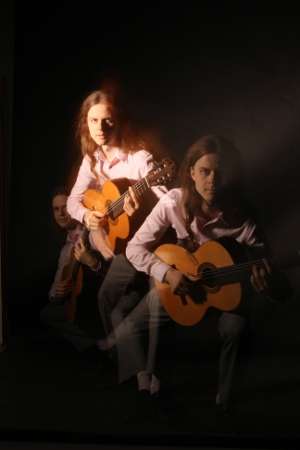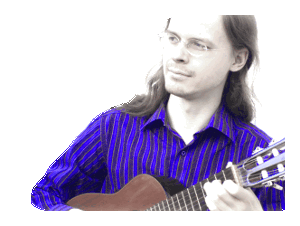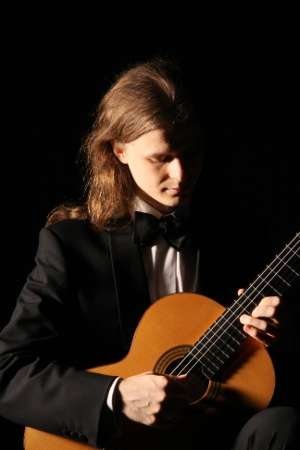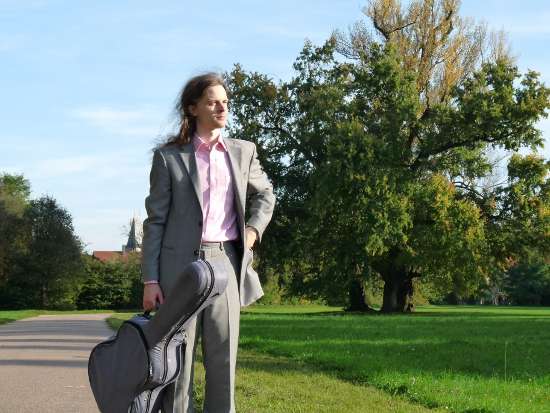Interview with Samuel Klemke–a guitarist with a DUO factor!

In December 1978, Samuel T. Klemke was born in Herdecke (Ruhr) GERMANY. He was attracted towards guitar at a tender age of six months. Up to the fourth year of life, he had learnt to read the notes, and from then on the father had started teaching him systematically.
From 1986 till 1992, the young musician played in different casts (guitar trio, duo, as well as solo), and regular performances in the public were on the agenda. Later Samuel focussed mainly on duo with his sister Laura, and ‘the Guitar Duo Klemke’ had got into life. Nevertheless, both had had their first joint public appearance in 1984, and at the age of seven Samuel had had his first solo-evening, playing works by Mauro Giuliani, Fernando Sor and Niccolo Paganini. Many concerts as well as TV- and radio-recordings followed.
Having taken part in international competitions since 1996, Laura and Samuel have already won 25 prizes. Both have attended various master classes regularly. In the winter semester 1999 Samuel started studying the guitar with Prof. Monika Rost at the FRANZ LISZT Academy of Music in Weimar, where he did his diploma eight semesters later (with the mark “very good”). It was followed by post-graduate studies with Prof. Thomas Müller-Pering, also in Weimar. He finished his studies in 2007 by passing two extraordinary concert examinations. In 2004, in expectation of outstanding artistic results, Samuel got a two-year scholarship to study the guitar works by Hans Werner Henze and Toru Takemitsu.
 In autumn 2000, Laura was admitted to the guitar class of Prof. M. Rost. She got her degree in 2004 (also with the mark “very good”) and studied six semesters post-graduately with Prof. Thomas Müller-Pering afterwards. In 2008, she finished with an excellent concert examination. Within the scientific programme of the Thuringian ministry of education and cultural affairs the committee for social equality of the FRANZ LISZT Academy of Music in Weimar gave a scholarship to Laura (for the project: Les Guitares Bien Tempérées – Opus 199 by Mario Castelnuovo-Tedesco). Furthermore, the academy – expecting outstanding artistic results – granted her a two-year scholarship to make the lute works of Falckenhagen accessible to the modern guitar.
In autumn 2000, Laura was admitted to the guitar class of Prof. M. Rost. She got her degree in 2004 (also with the mark “very good”) and studied six semesters post-graduately with Prof. Thomas Müller-Pering afterwards. In 2008, she finished with an excellent concert examination. Within the scientific programme of the Thuringian ministry of education and cultural affairs the committee for social equality of the FRANZ LISZT Academy of Music in Weimar gave a scholarship to Laura (for the project: Les Guitares Bien Tempérées – Opus 199 by Mario Castelnuovo-Tedesco). Furthermore, the academy – expecting outstanding artistic results – granted her a two-year scholarship to make the lute works of Falckenhagen accessible to the modern guitar.
Additionally, they started to study post-graduately for a concert examination chamber music (guitar) with Prof. Monika Rost in summer 2006 until 2009 when they played their last brilliant examination concert. Brother and sister Klemke support the contemporary Music, too, and that is why composers from all over the world are interested in the Guitar Duo Klemke. Samuel forms part of the “Ensemble Marges” – a group which attends exclusively to modern music. Thus, both guitarists took part in many world premières. By their commitment Shin-Hye Lee (Korea) wrote the work “Zug des Lebens” (the passing by of life – 2005), Norikazu Okabe (Japan) composed “Monakkord – Hommage to Toru Takemitsu” (2006) and “Tree pieces for guitar” (2008), both for solo guitar, and the German Andreas Willers composed “Narrativ” (narrative – 2004).
Hundreds of concerts brought Laura U. Klemke and Samuel T. Klemke into many European countries and to Central-, South, North America and Japan. Amongst others the musicians appeared in the “Kleinhans Music Hall” Buffalo and in the Maharishi University of Management – USA, “Tokyo Bunka-Kaikan” Tokyo – Japan, at the “Bachfest Leipzig” Leipzig – Germany, the “XV Festival Internacional de Guitarra” Lima – Peru, the “12º Concorso Chitarristico Internazionale di Savona” Savona and the “XXI Festival Internazionale di Chitarra” Udine – Italy, the “Hudebni Festival Vysočina” and at the “Jihočeský Hudebni Festival” – Czech Republic. They gave master classes in the USA, Peru and Germany.
 We had an email interview with Samuel.
We had an email interview with Samuel.
Q1. Tell us about your childhood. Revisiting those days, how you liked music?
I grew up in a family totally devoted to classical music. My musical roots reach back to my great-grandfather who already played music. My great-aunt was organ player, my grandmother a professional soprano and finally my father a classical guitarist. In my childhood I mainly listened to classical music and was playing with the guitar with 6 months. I always saw my father practicing, so it was quite natural that I wanted to do this also. At age four I finally got my first lessons on a small guitar from my father. And this led to where I am now.
Q2. How you got trained in music? Do you enjoyed the schedule where you sat hours practicing while other children played games and made merry?
With my father I had lessons every day. In the beginning the lessons were only a few minutes, so I already was looking towards the next day for the next lessons. It was really like playing and exploring what every child does and not an obligation at all. Also when I grew older there always was enough time to do something else.
Q3. Your instrument, classical guitar—what specialty made you pick it?
Maybe I should put it this way: The guitar picked me. Since my father was a guitarist and was teaching me in the beginning, of course I learned guitar, and later it was no question that I stay with this instrument, which can be so beautiful in colour and the many different ways of expression.
Q4. As a music composer, which element you like to take care most—rhythm, harmony, mood, or simply the genre?
For me art in general always should enrich life, should express beauty in it’s many forms, and all the means should be used to get there.
Q5. Though you play classical guitar, do you like experiment and improvise in your music when you play on-stage?
I am always interested in things that broaden my horizon. For example I play in an an ensemble for vanguard music, trying out new techniques on the guitar, or conducting, using live-electronics etc. Of course most of the time I perform composed music, that is, what I am used to, but I started improvising some time ago and this year had a concert where I played some improvisation – and improvised in it’s real form: I did not know before what I was going to play, had no plans layed out before – it was a success and I will continue this. I was always fascinated from the classical Indian Ghandharva music and would like to learn more about it. That is why I am so happy that I finally have the opportunity to come to India.
Q6. How does it feel to have a sister playing with equal quality and zest? Does it help to have someone around who could understand your music at a level where you want it?
This is a great enrichment. We play together for so many years that we do not need to communicate verbally what we want to do in music, we simply make music. Even on stage there is no need of visual communication, to perfrom together, we just feel what the other is doing or is going to do.
Q7. Talking about the inspiration behind your music, what makes you move inside and feel that a musical piece could be created?
I am a very well balanced person, so there is no urgent need to press out some music, but I think music is an essential part of life, as everything is made of vibrations, music has a great influence on us, and whether I create music or reproduce it, it is with the purpose of creating peace, harmony and happiness.
Q8. You have won many prizes and awards: what do you value more—awards or being able to be creative?
It is absolutely not the awards that count. As a performer it is most rewarding to accept the listener’s appreciation after a concert, to feel that you have made the people experience a great time, though nowadays the awards can help to get you there.
Q9. You have recorded CDs also—do you like to perform live or recording in a studio?
These are two very different things, though you do music in both cases. Performing live of course is the ultimate experience, for the player and for the listeners. But it is also very rewarding to work intensely on a recording and then have a finished product, other then a concert, where you start from the beginning every time, but it is very ambiguous, because usually the record is done you always see so many things that could have been better, only after some time, when you forgot the details, it becomes better. But I would very much prefer if there were no records at all. It is good for musicians to learn, but it would be far better if people would visit concerts more often to have that live-experience.
Q10. Tell us about your instruments and other tools you use to create music.
My guitar was made especially for me a few years ago from a German guitar maker, Frank-Peter Dietrich, and it is a very traditional model. I especially like the warm sound and singing qualities this guitar has. My sister has the same model. Both of us use nylon strings, because we prefer the softer sound, these material produces. And there is not much more needed.
Q11. Apart from music, what else you like to keep yourself busy in?
Making music is what I have devoted my whole life to. It is very time consuming to organize all the activities I do, like this world tour in the end of the year, where India will be a part of it. I am very much interested in film and doing projects in this genre, too, but usually it is somehow connected with my music. I also try to grow spiritually, helping the world to become a better place.
Q12. Do you feel music is an exclusive choice for you—if it were to be, what else you would have done if not music?
After school, when I had to make the choice what to do, it was no real choice, I just followed the path, that was layed out in front of me. And the more I followed it, the more I could feel that this is my Dharma. I was and still am interested in many things, would probably have been a good scientist, but I think whatever else I could have chosen, I would have ended up as an artist of whatever kind that may be. I know that I need the freedom to do what I want.
Q13. A message for our readers and budding pianists.
I am glad you were so interested in my comments that you finished reading up to here. I very much hope to see you in one of my concerts one day. And I want to thank you for your appreciation of music, especially the classical one, and if you play yourself I wish you find a way to let your inner self speak through your music. It is a long way to master any instrument and you never really feel getting to an end, but still playing music on any level is very rewading to yourself.



 Album Review—Inner Sanctum
Album Review—Inner Sanctum  Album review—Back To My Roots
Album review—Back To My Roots  Album Review—Days of Gypsy Nights
Album Review—Days of Gypsy Nights  Album Review—Open by Stephen Wallack
Album Review—Open by Stephen Wallack